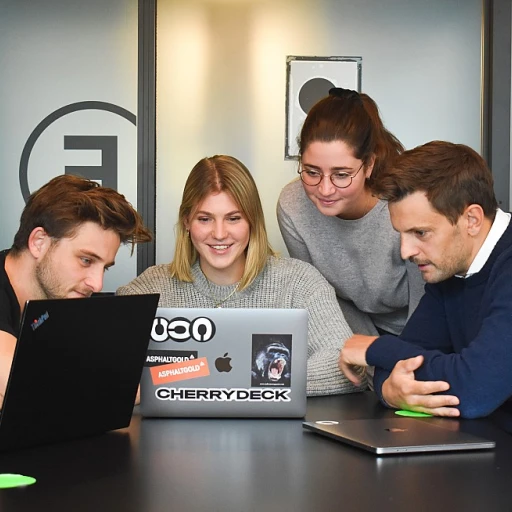
Understanding the Future of Work
Embracing Work Evolution: Preparing for Tomorrow
In today's rapidly shifting employment landscape, understanding the future of work is paramount for students and professionals alike. As industries evolve, so does the demand for new and improved skills. This evolution is a result of technological advancements, changing economic needs, and global influences that are reshaping workforce expectations. By developing an understanding of these shifts, individuals can create strategies to enhance their professional growth and be effective in their roles. Critical thinking, problem solving, and decision making are just a few of the capabilities that organizations now prioritize. These skills are not only vital for individual progression but are integral to foster a resilient learning environment. Professional learning and development are no longer confined to traditional classroom settings. Today's competitive edge depends on an individual's ability to adapt and integrate technology effectively into their work. An annual learning plan is an essential tool for navigating these changes and ensuring continuous skill development. This plan will guide students in enhancing their learning experiences and facilitate lesson planning that meets future demands. As part of a robust learning curriculum, these plans not only support critical competence but also offer feedback mechanisms vital for improving student and professional performance. The shift from conventional teaching practices to a more dynamic learning experience is critical. Embracing digital tools and learning support platforms enhances student learning while promoting the development of best practices tailored to the evolving job market. Such strategies are essential for creating a conducive learning environment where both professional growth and effective problem solving are achieved. For more insights into preparing for the future workforce, you might consider exploring cultivating an enterprise mindset to understand how to integrate industry-specific requirements into your learning path.The Importance of an Annual Learning Plan
Recognizing the Role of a Learning Plan in Personal Development
In the ever-evolving landscape of the workplace, the significance of continuous learning cannot be stressed enough. With rapid advancements in technology and shifts in job roles, having an effective strategy like an annual learning plan becomes crucial. This structured approach enhances individual growth and professional development, ensuring that the skills acquired are aligned with future demands. Creating a learning plan is more than a one-time activity; it is a dynamic and iterative process. It supports learners, whether students or professionals, in navigating their development journey. Structuring this plan effectively aids in understanding key learning objectives and outcomes while fostering critical thinking and problem-solving abilities. Incorporating feedback into your plan is equally important. It offers insights into areas needing improvement, enabling an adaptive approach that enhances student learning outcomes and supports professional growth. By incorporating feedback mechanisms, you'll be better equipped to refine your strategies and achieve your learning goals more effectively. Lastly, aligning your learning environment with best practices in teaching can improve student experiences significantly. An inclusive understanding of curriculum and lesson planning is essential, ensuring the adaptation of strategies that enhance student learning. This, in turn, encourages effective learning experiences, cultivating a culture of continuous improvement and lifelong learning. For a deeper insight into equitable learning strategies and how to ensure all learners are afforded the same opportunities, consider reading about "exploring equity in learning." This could guide you in establishing a fair and personalized learning path that meets diverse needs and fosters long-term success.Identifying Skills for the Future
Recognizing Future-Proof Skills
In the rapidly evolving employment landscape, staying ahead requires an understanding of the skills that will be in demand. As industries transform, valuable skills must also shift to meet new roles and expectations. To effectively determine the skills needed for future success, consider focusing on a few key areas of development.
- Critical Thinking and Problem Solving: Employers increasingly seek individuals who can think critically and solve complex problems. Engaging in activities that challenge your reasoning and offer insights into competitive expectations can enhance these skills.
- Digital Literacy: As digital tools continue to permeate workplaces, developing a robust understanding of technology is crucial. Embracing technologies that support information gathering, communication, and digital content creation will greatly improve your capability and employability.
- Adaptability and Continuous Learning: The ability to adapt to change and pursue lifelong learning is vital in a world where industries are in constant flux. Integrating skills that promote resilience and a proactive approach to learning will ensure you remain relevant and effective.
According to numerous business leaders, enhancing student learning through targeted skill improvement can significantly impact both personal and professional growth. Building a curriculum that supports ongoing development and incorporating best practices for learning support will create a favorable learning environment conducive to growth.
Moreover, annual learning plans should include strategies for effective feedback, student learning experiences, and problem-solving exercises. These elements can serve as cornerstones for student and professional learning, providing robust opportunities for decision-making and skill enhancement.
Designing Your Personalized Learning Path
Creating a Roadmap for Your Educational Journey
Designing your personalized learning path is a critical step in crafting an effective annual learning plan. Just as a student in a classroom benefits from a well-organized curriculum, professionals need a structured approach to their development. By understanding which skills to enhance, you can lay out a roadmap that supports both your professional growth and skill development. First, consider the skills that align with the future of work. It’s important to focus on areas like problem solving, critical thinking, and effective decision making. Identify the strategies and best practices that will guide you in improving these competencies. Your plan should take into account the various digital tools and resources available to enhance learning experiences. Leveraging technology will not only improve student learning but also create a dynamic learning environment. Next, gather feedback from your past learning experiences. Reflect on the challenges and successes you faced. This understanding will help you solve problems more effectively and tailor your plan to suit your unique needs. Incorporating structured learning support and a mix of teaching practices can significantly improve both your current skills and your aptitude for acquiring new ones. Consider including both formal and informal learning methods in your curriculum, much like students navigating different subjects in school. This may involve professional learning workshops, online courses, or even peer feedback sessions. Remember, your learning path is not static. As you progress, continuously evaluate and adjust your strategies to ensure they remain aligned with your objectives. This will enable you to enhance your learning experiences and support your overall professional development. Lastly, document your journey in a way that allows for reflection and future planning. Keep track of your progress, note any deviations from your initial plan, and be flexible in adjusting your learning pathway. By effectively designing and adapting your personalized educational journey, you pave the way for ongoing growth and success.Leveraging Technology for Learning
Embracing Digital Tools in Your Learning Journey
In today's rapidly evolving world, leveraging technology is pivotal for anyone seeking to improve their skill set. The strategic use of digital tools can fundamentally transform your learning experience, enriching it beyond what traditional classroom settings can offer. Engaging in online platforms and educational apps can enhance student learning and development. These resources provide a flexible learning environment where you can learn at your pace. For instance, virtual simulations and interactive courses help students develop critical thinking and problem solving abilities. To effectively improve student outcomes, consider integrating the following strategies into your annual learning plan:- Utilize Interactive Platforms: These platforms offer immersive learning experiences through simulations and gamified content that make learning dynamic and engaging.
- Access Diverse Curriculum Resources: Online repositories host a wealth of resources that can support diverse learning styles, offering a wide variety of perspectives and teaching practices.
- Incorporate Video Tutorials and Webinars: These resources provide visual and auditory learning experiences that can be more effective for grasping complex concepts.
- Engage with Online Communities: Professional and student forums offer opportunities for feedback and discussion, which can enhance understanding and decision making skills.
Evaluating and Adjusting Your Learning Plan
Fine-Tuning Your Learning Path: Making Adjustments
An effective learning plan requires ongoing evaluation and adjustments to stay aligned with evolving industry demands and personal goals. As you progress on your annual learning journey, evaluating your achievements and areas for improvement is crucial. Here’s how you can do this effectively:- Regularly Review Your Progress: Set aside time to assess the skills and knowledge you’ve gained. Reflect on your development and consider whether your learning plan aligns with your professional growth objectives. This reflection supports a deeper understanding of your overall learning experiences.
- Incorporate Feedback: Seek feedback from peers, mentors, or supervisors to gain different perspectives on your learning and development. Constructive feedback helps identify gaps and areas to enhance student and professional learning experiences effectively.
- Adapt to Industry Trends: Stay informed on changes in the job market and adjust your learning plan to include new skills and strategies needed for decision making and problem solving. This proactive approach will ensure continuous skill development tailored to the evolving work landscape.
- Leverage Digital Tools: Use technology to track your learning progress and outcomes. Digital tools can provide data-driven insights and personalized support, making your curriculum more effective and adaptable to your needs.
- Reflect and Reassess Goals: Periodically review your learning goals to ensure they remain relevant and attainable. Revising your objectives as needed helps maintain a learning environment conducive to critical thinking and professional growth.













